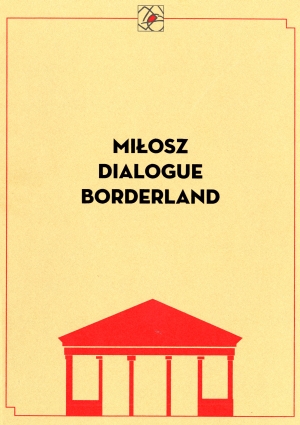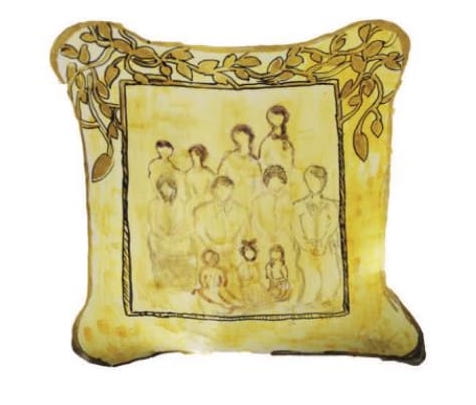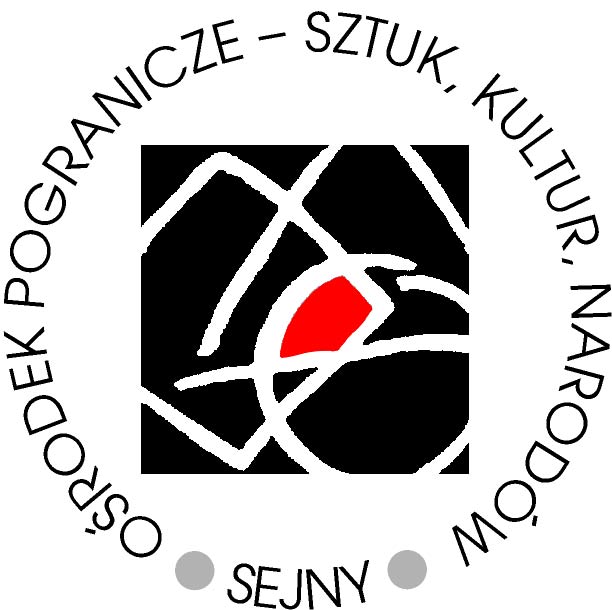Book - "Miłosz - Dialogue - Borderland", PDF

Foreword. Czesław Miłosz’s life and thought are enclosed by the circle of return. It was apokatastasis, rendered in poetry and heading for existence. The exile shared the fate of fugitives, emigrants, and others deprived of their roots, those displaced by the winds of history, thrown into the outside world. The wanderer built his home in his mother tongue and remained true to it.
He observed the world around him like Gucio Enchanted, the hero of his favourite children’s book: first, at close quarters, immersed in his small homeland as if in the calyx of the flower, then, from far away, like a world traveller encompassing continents, languages, generations and epochs...
Just like many inhabitants of Wilno [LIT: Vilnius], the Grand Duchy of Lithuania and the borderlands of Eastern and Central Europe, Miłosz lost his family home, swallowed by the “abomination of desolation.” But he had a dream of return. (For poets and wanderers dreams are of utmost importance; they are their workshop.) So he attempted to leave the Land of Ulro, the land of disinheritance.
He worked out the paradigm of return and persisted in inscribing it in the foundations of the new epoch. He would often repeat the Hegelian formula he had learnt in his schooldays: “overcome while retaining.” The Returner overcame the Exile, a victory to a large degree assisted by the memory of his childhood and his stubborn refusal to accept the verdict of history as final. His oeuvre, the product of the fifty years spent in the West, contains a map priceless for those in disagreement with the place marked out for them by historical necessity. He was given the chance of returning because he lived long enough to see the demise of the ideologies and dictatorships responsible for the barbaric twentieth century. He visited the places he used to wander in his early youth: “I forced my way through a thicket where a park was once, but I did not find the traces of the lanes.” (from Return)
One of the places Czesław Miłosz returns to is Krasnogruda, the prewar estate of his mother’s relatives situated near Sejny at the Polish-Lithuanian border. Here, in the Krasnogruda Manor, he used to spend his school and university holidays, experienced his first heartaches and crises of youth and wrote poetry. He felt strongly attached to this “place of many contradictory experiences,” an attachment he also expressed in his later writings. No wonder he wished to return here and used the first opportunity that presented itself in 1989.
Here, he met the founders of the Borderland Foundation who had also arrived at that time in Sejny to found a centre of multicultural practice inspired to a large degree by the ideas they found in Miłosz’s books. And they remained in close touch with each other. As long as he felt strong enough he made several journeys to Sejny and Krasnogruda at the invitation of the young Borderlanders.
His returns became something more than just trips to places remembered from his youth. Following Miłosz, the young artists found themselves on the line of return. They did their best to participate in his experience and weave it into their own work. From here came their reverence for the issues of memory and place. They began the process of gaining possession of the Krasnogruda Manor with its park and the remains of the buildings, hoping to restore them physically and bring them back to life. Such was the origin of the idea of the International Centre for Dialogue, a place meant to become a workshop for the craft of building bridges between cultures and the exploration, through education and artistic practice, of the ethos of the people of the borderlands. Czesław Miłosz declared his full endorsement of the idea and agreed to support it with his patronage. Until his final days he closely followed the progress of the venture’s realization. Before he passed away, he managed to acquaint himself with the plans for the manor’s renovation and the design of the new buildings to be erected there. In his letter to the Borderland Foundation, he wrote:
It is very fitting that instead of a manor house in Krasnogruda there will be a centre of international dialogue, and that Sejny will preserve the memory of what it was then, before the First World War, and even earlier, when the superb gymnasium was still here, among the graduates of which was Stanisław Kunat and other prominent activists of the post-1831 wave of emigration; the time when the shtetl of Sejny was a centre of religious thought worthy of mention in the Encyclopaedia Judaica, and Bishop Baranauskas resided here.
Once we were taught Hegel’s formula: “To overcome while retaining.” And I suppose that this is the best way of expressing our attempts at drawing closer to the past. Immersed in “now” we ought to try to transpose what was into a new dimension, so to speak, fully conscious of the fact that we are working for what is to come and that we are preparing a gift for those who are to take our place. I draw enormous joy from
being able to say in my thoughts to those with whom I walk around Krasnogruda and Sejny: “You are in good hands; you are not forgotten but present.” It might have been possible for the “abomination of desolation” to persist, and the fact that it has not is a sign of human good will and wisdom.
Krzysztof Czyżewski








